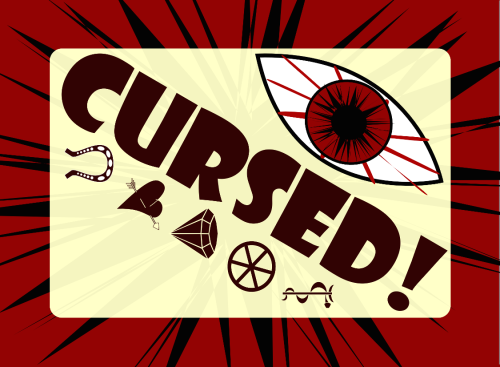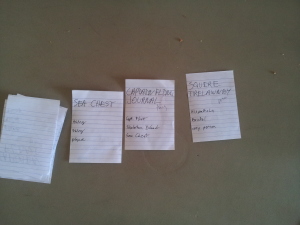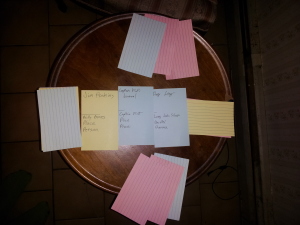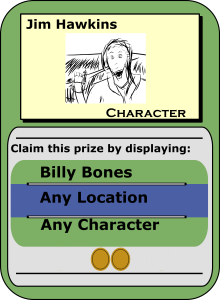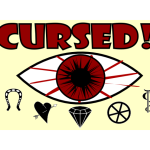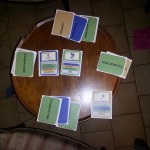
In late July, Steve Cole of Escape Velocity Games announced a contest he was running for microgames based on classic novels. You can view lots of the entries in the corresponding BoardGameGeek thread. Strangeland Games threw our hat into the right with a set collection game based on Treasure Island. The rules didn’t require a new game (some contests do), but we didn’t have a microgame in the works, so we started from scratch. We thought we’d share the development process with everyone, since it was fairly compressed and thus easier to document.
Initial Concept Phase
We’re avid readers here at Strangeland Games, so we had no problems rattling off different classic works of literature that would inspire a decent game. We settled on Treasure Island because it is a well-known story, the theme is accessible even if you haven’t read the book (who doesn’t love treasure?), and the adventure lends itself well to multiple types of games. A microgame should be easy to learn and quick to play, so we wanted to pair it with a novel that was of similar caliber (the Illiad, while great inspiration, would not have the same light, accessible flavor).
First Prototype
We settled on a set collection mechanic to go with the idea of a treasure hunt. To keep the game small, we went with each card both describing a set to be collected and being an ingredient in a set. Each set consists of three cards and each hand is also three cards in order to streamline the decision-making process. Also, to better stay within the bounds of a small deck, we went with a card trading mechanic to change-up your hand rather than a discard and draw mechanic. With only 18 cards, we realized that your average attentive player could probably keep track of who’s got what, which adds a card-counting aspect to the game. You don’t need to count cards to play well, but it would be one strategy you could pursue.
We worked up our card ideas based on people, places, and things from the book, threw together a quick spreadsheet to list the set that each card would describe, and made prototype number 1.
Second Prototype
We playtested version 1 and came to a few conclusions. The first was that we’d made too many sets that had specific card requirements (e.g. “Jim Hawkins”) and not enough sets that had more general requirements (e.g. “Any Character”). The second was that, if we’re going to have variation in how hard it is to collect a particular set, then the sets should have different values. The third was that the game was fun and fit the microgame genre well (quick setup, 15 minutes to play, small deck didn’t feel like it cramped our style). So, the game was worth pursuing and we made prototype #2.
After using colored index cards to make the card type more visible, we realized that having the backs advertise what kind of cards everyone had is a great piece of added information. Now, the card counting became a little easier AND you could have a bit of information about the top card of the draw pile before deciding whether to take that card or trade with something out in the open. Great accidental discovery! From the second prototype, we also learned that 18 cards was a few too few, so we bumped it up to a 24 card deck, which can more comfortably accomodate four players.
Print and Play Prototype
Since the contest required a fully ready print and play for submission, I used this as a test case for batch-producing print and play files for card games. We began work on Treasure Island while waiting for Cursed! to ship and neither of us wanted to put together the print and play for that 104-card game by hand. So, we mixed some Inkscape extensions, hand-drawn icons for each card, and some homebrewed Python (that I will be releasing in the near future for anyone to use) and converted an SVG template, a spreadsheet, and a folder full of icons into the PnP prototype featured at the top of the post.
Request for Playtesting
The full rules and the print and play files are linked from this work-in-progress thread. We’d love feedback from anyone willing to read the rules and/or try out the game. You can leave comments on this post, on that WIP thread, or hit us up on Twitter.
